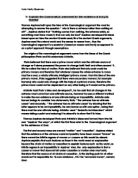The theological explanation for how the universe came to be in existence would be Creation and to Christians Genesis is the creation story they refer to. Aquinas bases his cosmological argument on Aristotle’s causality and welds it to his belief in a Creator, the being that caused creation. The first of the ways of the cosmological argument is Motion or Progression, the idea that we all experience with our senses motion which has a previous cause for a prior unmoved mover. The principle of movement must never change because otherwise everything would cease and stop. This similar to the scientific ideas that have been proven like the natural laws of physics if gravity ceased, matter would float and us humans wouldn’t function and die. Darwin’s evolution theory is an example primarily of progression, humans would cease if we didn’t evolve genetically to be the fittest to survive. Aquinas came up with the analogy of the dominos to help explain the idea of movement, there must be a prime mover to push the first domino to start the chain of dominoes falling, its the same with causation there must have originally been a first mover to start the cause and effect chain going. Inductively leaping, Aquinas said that this is not infinite regress, it cannot go on forever there must be a First Mover and it must have a different form, or to be different in nature, this idea is very much platonic. Another analogy to help describe this inductive leap is the bread that the baker makes looks nothing like the baker in form or nature but are very much interlinked like the first mover to the efficient following causes. The effect is nothing like its cause but only its skills of the baker can be tasted in the bread. If we say God is omnipotent we can never be the “baker” but we can gain some knowledge or skills from the baker. So the first cause cannot be caused so we say it is uncaused. Aquinas said it his book: “Nor can the being of a thing continue after the action of the agent has ceased, if the agent is the cause of the effect not only in respect of becoming but also in respect of being.” Aquinas argues that the causes cannot be the same nature as its effects this is coherent in the 2nd and 3rd way too. The 3rd way of supposedly proving God’s existence or at least a first cause is existence. Our existence is enough proving that the universe was created. We are dependant and have a necessary existence and dependant on that necessary principle. The uncaused cause will not have existence that is dependent on anything else. Within the universe everything is dependant and contingent but because the first uncaused cause is self-created we call its existence necessary. Mackie used the analogy of the train to support this way, the train requires an engine to pull it so therefore the carriages are dependent on the necessary motion of that engine. Aquinas makes a 2nd inductive leap saying that a first unchanged changer or unmoved mover necessary existence is what we mean by God.
The cosmological argument has been criticised and questioned by philosophers. David Hume was one of them; he wasn’t religious and sceptical about Aquinas ideas and beliefs about the reasoning behind the argument. He asked why does there have to be a big grand beginning, why not infinite regress? This is supported by physicists with the idea that the universe is forever expanding so therefore why does there have to be a beginning. He then goes on to ask what about the universe being there, which is known as the steady state theory. The belief that the universe in an unchanged state which has no beginning or end: “The universe is self-regulating, self-sustaining and self-organising.” This quote conflicts with Aquinas’ 3rd way saying that we don’t need dependence because the universe looks after itself. It also goes on to suggest that there is nothing new in the world, everything that dies is replaced kind of like the idea of Reincarnation and there is no purpose to existence. This is hard for religious thinkers because having no purpose other than to reproduce isn’t self-fulfilling. Another theory is that the universe came to existence by chance, kind of supported by the big bang theory because it is unknown what started the chain of events that cause the bang. This also supports the idea of not having a purpose because the whole universe in theory could have been an accident. Bertrand Russell said that “just because humans and mammals have a mother doesn’t mean that the universe has to have a mother” suggesting that an explanation isn’t really needed. Coppleston, a religious believer based his counter argument defending the cosmological argument saying that just because the God doesn’t have a justification doesn’t mean it doesn’t mean it doesn’t exist.
Overall the kind of God that Aquinas leaves his audience with when he explains the existence of God cosmologically is the God of philosophers. The idea of God isn’t theistic or deistic which is a problem for Christians because they need to able to relate with to him and a God that just creates the universe and doesn’t care for people which the argument portrays is not something that anyone not only Christians can relate to.








